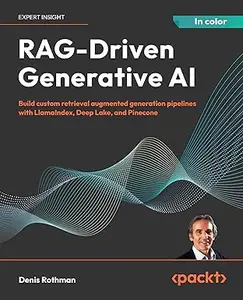
Free Download RAG-Driven Generative AI: Build custom retrieval augmented generation pipelines with LlamaIndex, Deep Lake, and Pinecone
by Denis Rothman
English | 2024 | ISBN: 1836200919 | 200 Pages | True ePUB | 14.5 MB
Designing and managing controlled, reliable multimodal generative AI pipelines is complex. RAG-Driven Generative AI provides a roadmap for building effective LLM, computer vision, and Generative AI systems that will balance performance and costs.
From foundational concepts to complex implementations, this book offers a detailed exploration of how RAG can control and enhance AI systems by tracing each output to its source document. RAG’s traceable process allows human feedback for continual improvements, minimizing inaccuracies, hallucinations, and bias. This AI book shows you how to build a RAG framework from scratch, providing practical knowledge on vector stores, chunking, indexing, and ranking. You’ll discover techniques to optimize performance and costs, improving model accuracy by combining with human feedback, managing costs with when to fine-tune, and improving accuracy and retrieval speed by combining with embedded-indexed knowledge graphs.
Experience a blend of theory and practice using frameworks like LlamaIndex, LangChain, Pinecone, and Deep Lake and models from Hugging Face, OpenAI, and Google Vertex AI.
By the end of this book, you will have acquired the skills to implement intelligent solutions, keeping you competitive in fields from production to customer service across any project.
What you will learn
Mitigate common AI challenges, such as bias, hallucinations, and misinformation
Integrate computer vision for multimodal search
Customize and scale RAG-driven Generative AI systems across various domains
Deep dive into Meta’s RAG model for question-answering
Learn to control and build robust Generative AI systems grounded in real-world data
Build RAG-driven LLM and computer vision pipelines from design to large-scale implementation
This book is ideal for data scientists, AI engineers, machine learning engineers, MLOps engineers, as well as solution architects, software developers, and product and project managers working on LLM and computer vision projects who want to learn and apply RAG for real-world applications. Researchers and natural language processing practitioners working with large language models and text generation will also find the book useful










Leave a Reply
You must be logged in to post a comment.